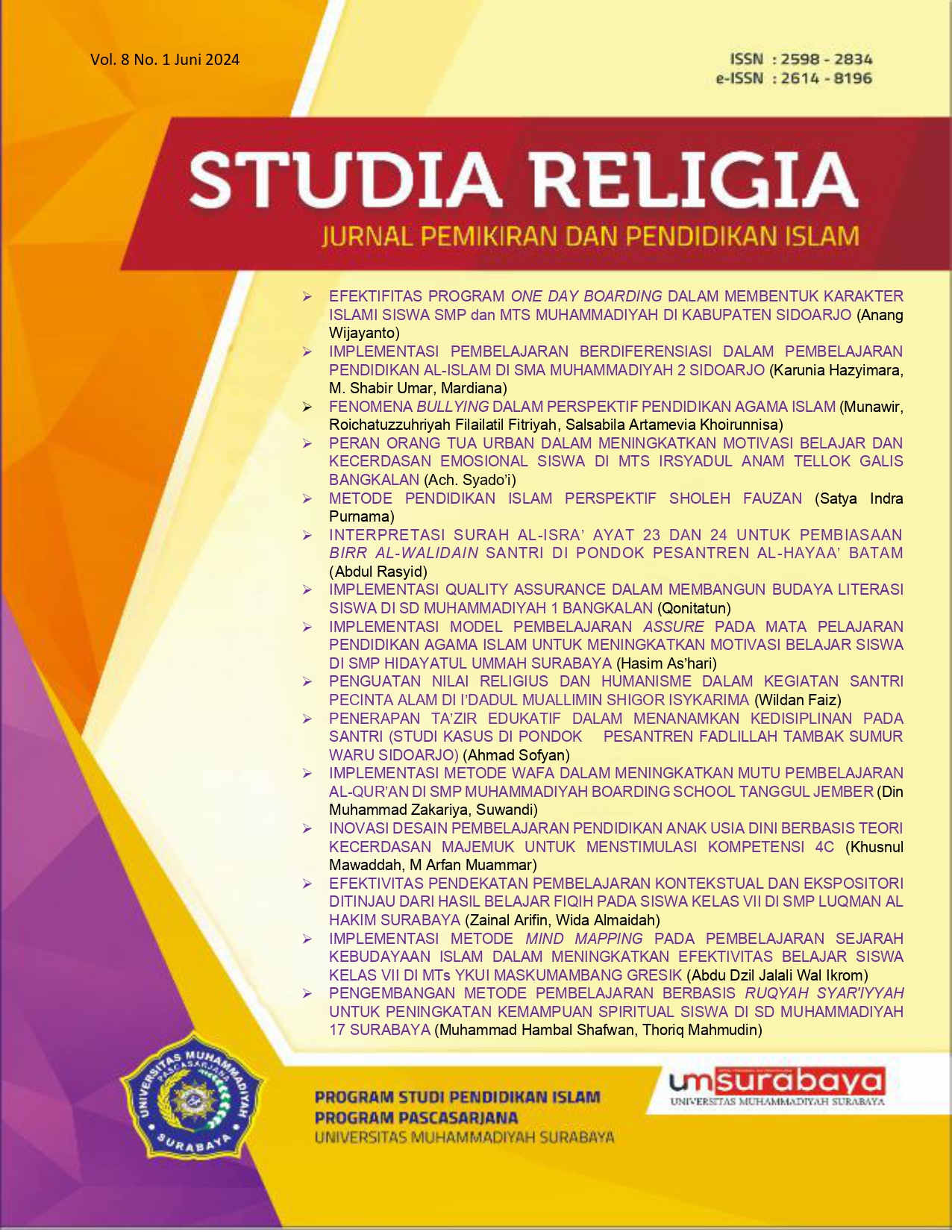PENGUATAN NILAI RELIGIUS DAN HUMANISME DALAM KEGIATAN SANTRI PECINTA ALAM DI I’DADUL MUALLIMIN SHIGOR ISYKARIMA
DOI:
https://doi.org/10.30651/sr.v8i1.22491Abstrak
Masalah pendidikan merupakan persoalan pertama dan mendasar dalam hidup dan kehidupan manusia karena pendidikan merupakan hakikat hidup manusia, mewujudkan peserta didik sebagai manusia yang mempunyai karakter religius dain humanisme merupakan dasar penilaian dalam proses merubaih sikap dan perilaku seseorang. Rumusan masalah dari tesis ini adalah Bagaimana Penguatan nilai humanisme dalam kegiatan Santri Pecinta Alam di I’dadul Muallimin Shighor Isykarima, kedua, Bagaimana penguatan nilai religius dalam kegiatan Santri Pecinta Alam di I’dadul Muallimin Shighor Isykarima, ketiga, Bagaimana peran penguatan nilai humanisme dan religius dalam kegiatan Santri Pecinta Alam di I’dadul Muallimin Shighor Isykarima. Penelitian ini menggunakan pendekatan kualitatif deskriptif. Teknik pengumpulan data menggunakan wawancara, observasi partisipan dan dokumentasi. Analisis data terdiri dari reduksi data, penyajian data dan penarikan kesimpulan. Pengecekan keabsahan data dilakukan melalui perpanjangan keikutsertaan, ketekunan atau keajegan pengamatan, triangulasi dan pemeriksaan teman sejawat. Hasil dari penelitian menyimpulkan bahwa pertama: Kegiatan Mukhoyamah, Baksos, dan berbagi takjil. Kedua adalah solat malam, solat dhuha, puasa senin kamis, kajian dan qurban. Ketiga, Guru sudah memberikan contoh sikap yang baik dalam menerapkan nilai-nilai Humanisme dan Religius berdasarkan observasi dan temuan lapangan.
Referensi
Hazyimara, Karunia, Wenty Septria Darma Suwarni, Fitri Indriani, and Rosdiana. “Peran Guru Dalam Pembentukan Karakter Peserta Didik Sebagai Respon Terhadap Degradasi Moral.” At Turots: Jurnal Pendidikan Islam 5, no. 4 (2023): 632–643.
Kamaluddin, H. “Bimbingan Dan Konseling Sekolah.” Jurnal Pendidikan dan Kebudayaan 17, no. 4 (2011): 447–454.
Moeleong, Lexy. Metodologi Penelitian Kualitatif. Bandung: Remaja Rosdakarya, 2002.
Priatna, Tedi. Disrupsi Pengembangan Sumber Daya Manusia Dunia Pendidikan Di Era Revolusi Industri 4.0. Bandung: Pusat Penelitian dan Penerbitan UIN Sunan Gunung Djati Bandung, 2019.
Shafwan, Muhammad Hambal. “HADITH EDUCATION IN FORMING CHARACTER OF EARLY CHILDHOOD.” Studia religia 4, no. 1 (n.d.): 01–11. https://core.ac.uk/download/pdf/327263797.pdf.
Sholikhun Muhamad. “Pembentukan Karakter Siswa Dengan Sistem Boarding School.” Wahana Islamika: Jurnal Studi Keislaman 4, no. 1 (2018): 48–64. http://wahanaislamika.ac.id/index.php/WahanaIslamika/article/view/20/13.
Siswati, Vialinda. “Pesantren Terpadu Sebagai Solusi Problematika Pendidikan Agama Islam Di Era Globalisasi.” Jurnal Pendidikan Islam Indonesia 2, no. 2 (2018): 123–138.
Solihin, Nandang. “Pendidikan Agama Islam Di Era Disrupsi.” Stitdaarulfatah (2017): 283. http://www.stitdaarulfatah.ac.id/journal/index.php/jmf/article/view/20/17.
Sri Wening. “The Nation’s Character Building Through Value Education.” Jurnal Pendidikan Karakter 1, no. 2 (2012): 55–66.
Tolchah, Moch. “Studi Perbandingan Pendidikan Akhlak Perspektif Al-Ghazāli Dan Al-Attas.” EL-BANAT: Jurnal Pemikiran dan Pendidikan Islam 9, no. 1 (2019): 79–106.
Undang-Undang Republik Indonesia. “Sistem Pendidikan Nasional,” no. 20 (2003): 147–173.
Unduhan
Diterbitkan
Terbitan
Bagian
Lisensi
Hak Cipta (c) 2024 wildan faiz

Artikel ini berlisensi Creative Commons Attribution-NonCommercial 4.0 International License.
Penulis tetap memegang hak atas karyanya dan memberikan hak publikasi pertama kepada jurnal ini yang secara simultan karya tersebut dilisensikan di bawah:
Creative Commons Attribution-NonCommercial 4.0 International License









